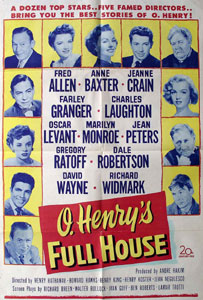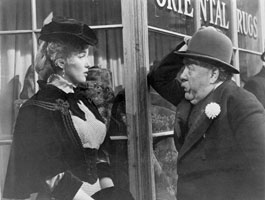 Nobel Prize author John Steinbeck introduces O. Henry's Full House (1952) with an overview of the legendary author of short-short stories with stings in their tails. We're entering an anthology-film of five O. Henry tales, each with a different leading director, & with a degre of focus on Christmas.
Nobel Prize author John Steinbeck introduces O. Henry's Full House (1952) with an overview of the legendary author of short-short stories with stings in their tails. We're entering an anthology-film of five O. Henry tales, each with a different leading director, & with a degre of focus on Christmas.
The first tale is directed by Henry Koster, best remembered as the director of the pooka classic Harvey, 1950). "The Cop & the Anthem" stars Charles Laughton as Soapy Throckmorton, a tramp who affects the proud manner of an aristocrat, despite his raggedy homelessness.
He lives a desparate life in the best of times, worsened by winter's falling temperatures. Among people with whom he interacts, Marylin Monroe has a beautiful & very unexpected cameo, as a prostitute.
Soapy decides jail is the place to be, where his "simple but discriminating tastes" can be met, since these amount to being warm & fed. He tries all manner of petty crimes in order to get arrested, but is foiled at every turn.
Laughton's character-performance is first rate. The classic tale with its ironic twist is played with extravagant charm, to "Glow Worm" on the soundtrack.
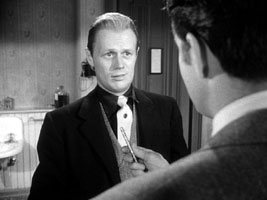 The second tale is "The Clarion Call" directed by Henry Hathaway, who helmed many classic westerns including The Sons of Katie Elder (1965), but this piece draws more on the film noir tradition as Hathaway also addressed in Call Northside 777 (1948). The second tale is "The Clarion Call" directed by Henry Hathaway, who helmed many classic westerns including The Sons of Katie Elder (1965), but this piece draws more on the film noir tradition as Hathaway also addressed in Call Northside 777 (1948).
Dale Robertson is Barney Woods, a police detective looking into a murder. The only clue is the killer's pencil, left at the scene, on which "Camptown Races" is printed (we also get the tune "Camptown Races" on the soundtrack).
Barney recognizes the golden-cased pencil as a prize from a singing contest. He knows who it belonged to.
Richard Widmark with his trademark loony laugh plays Johnny. In a neighborhood bar, he slaps his girl (Ava Norring) around, proving himself an abusive s.o.b. When he sees Barney, he's delighted, as they knew one another in the old days. He's surprised to learn Barney's now a police detective.
The cop owes Johnny a debt, as there was a time in the past when he was on the cusp of heading for prison but for Johnny's intervention. Now Johnny intends to collect on the debt. He demands a thousand dollars.
Barney is honor bound not to arrest Johnny unless he can first raise the thousand. Hawking everything he can, he manages to raise a mere three-hundred. And Johnny will be on a midnight train to Chicago, so there's not much time remaining.
Widmark plays the character over the top, but it's a great character. Robertson is a lot subtler. This is an awfully serious tale for O Henry to have penned, though the "twist" in the tail isn't one of his best.
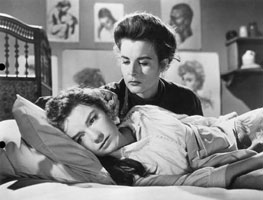 The strongest tale of the lot is the third, "The Last Leaf," an absolute poem of a short story that has been brought to life with sensitivity that overcomes melodrama.
The strongest tale of the lot is the third, "The Last Leaf," an absolute poem of a short story that has been brought to life with sensitivity that overcomes melodrama.
As filmed by Jean Negulesco (whose many great films include Johnny Belinda, 1948), this is a piece of heroic fiction almost unbearable in its sorrowfulness.
A struggling drunken old artist (Gregory Ratoff) in his gruff manner cares for a young woman upstairs, who has penumonia. In their tenement environment, such illness can be a death sentence. She might survive, but she has lost the will to live, having lately been spurned by an actor she should never have been involved with.
Joanne (Anne Baxter), attended to by her sister Susan (Jean Peters), watches out her window at the brownstone wall across the alley, to which Boston ivy clings. One by one, the leaves fall as winter deepens, & the young woman becomes convinced she can only live until the last leaf falls.
Behrman, the artist, has his canvasses rejected continuously by galleries, as he's far ahead of his time doing Pollock before Pollock was born (which the film script understands as O Henry could not).
How that last leaf informs the life & death of both "the old goat" artist upstairs, & the sick young woman downstairs, is the heart of this tremendous tale. I first saw this movie-anthology on television when I was a young child, & it was "The Last Leaf" that haunted my heart forever.
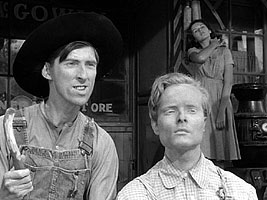 Tale number four, O. Henry's exceedingly well known "Ransom of Red Chief," has one of the greatest of American directors, or world directors for that matter, Howard Hawks. Tale number four, O. Henry's exceedingly well known "Ransom of Red Chief," has one of the greatest of American directors, or world directors for that matter, Howard Hawks.
William Smith (Oscar Levant) & Samuel "Slick" Brown (Fred Allen) are criminals from up north. They decide on a little kidnapping scheme to get themselves some needed funds.
One of O Henry's wittiest wee tales, the "bad" guys who bring the kidnappers to life are great comics. "J.B." (Lee Aaker, who also played Rusty in the early television series Rin Tin Tin) is the boy they kidnap. He's a clever little hellion who was absolutely the wrong kid to grab in a 'tator sack.
His family has no intention of paying any ransom. They are not the least worried about J.B., knowing it won't be long before those fool yankees bring him back just to be rid of him.
By the end, the tormented kidnappers will be eager to pay the ransom themselves, whatever it takes to convince the family to take him back. Amusing throughout!
As an unimportant aside, there's need for a bear in one scene, & it's a bit odd to see it's a Malayan sun bear.
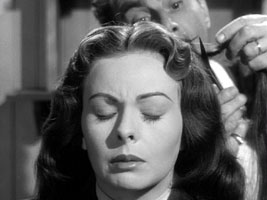 The fifth, final tale is "The Gift of the Magi," undoubtedly the bestest known of O. Henry's best known tales.
The fifth, final tale is "The Gift of the Magi," undoubtedly the bestest known of O. Henry's best known tales.
It was helmed by Henry King who directed westerns, swashbucklers, romances & war stories with equal skill, including Twelve O'Clock High (1949).
Set in 1905, "The Gift of the Magi" is admirably acted by Jeane Craine & Farley Granger as the newlyweds, who famously each give up their only treasures for one another, in trade for Christmas gifts that will no longer be useful to either.
Allegedly one of the most endearing tales of all time, I actually find it one of the cruelest in O. Henry's canon, & a marvel to me that people have always found it romantic.
Quite a long while ago in a book published as Wisewomen & Boggy-boos, I imbedded a very brief spoof of the plot of "Gift of the Magi," which ran a single sentence in length, thus:
"The woman sold her enormous trousers to buy her husband ribbons for his beard, only to find that he had sold his beard to buy his wife suspenders."
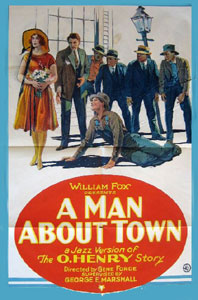 The restored O. Henry's Full House on dvd included among the extras a pair of two-reel comedy shorts selected from among thirteen silent films in the "O. Henry Fox Featurette Series." Girls (1927) is has smart-aleck intertitle cards, regarding a young man (Ricahrd Walling) too shy to speak to girls.
The restored O. Henry's Full House on dvd included among the extras a pair of two-reel comedy shorts selected from among thirteen silent films in the "O. Henry Fox Featurette Series." Girls (1927) is has smart-aleck intertitle cards, regarding a young man (Ricahrd Walling) too shy to speak to girls.
The girls on campus find out he's never been kissed. They have a contest to see who can steal his virginity. Pursued by girls who want to kiss him, it always goes awry for Tom.
A lot of it just isn't funny, too many of the "jokes" consisting of such gags as throwing jam in someone's face. But the bit when he ends up in the girls' locker room is funny.
The tepidity of the adaptation is redeemed by one hysterical bit when a school marmish girl (Sally Philpps) gets her first kiss, & hops around like a Mexican jumping bean. So a few of the gags do work across the centery, including the final kissing spree.
A Man About Town (1927) is billed as "a Jazz Version of a Story by O. Henry," featuring a clerk named Amos (Barry Norton), a young klutz who stumbles through a number of pratfalls.
The pratfalls aren't especially good. One main gag is when he bumps into guys who get mad enough to want to beat him up, so he runs off. That close call spoilt his timing with the banker's daughter (Ruth Eddings) for whom he has fallen, his rival being the titular "man about town" Jim Dandy (Robert Livingston).
The biggest gags involve a bicycle crash & getting stuck in a smoking fire bin, & god only knows what is "jazz" about all this.
If not good, it at least gets odd, when the story breaks into a fantasy about what the klutz's life could've been in the medieval world, supposing he were a knight in armor with a trusty steed. The broadsword duel with cardboard swords required some marginal choreography.
Amos buys a wacky invention, a belt that gives him super strength. It works only if he can keep it plugged in. In all, a pretty bad film, & neither Girls nor A Man About Time capture the spirit of O. Henry.
copyright © by Paghat the Ratgirl
|
